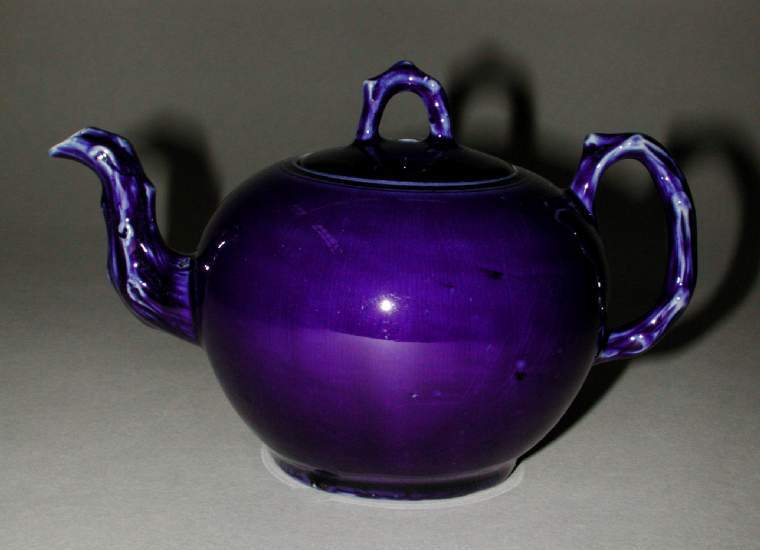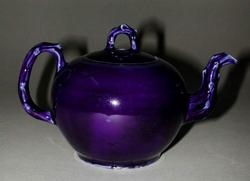Awaiting location update
Maker(s)
Factory:
Wedgwood, Aaron
(Possibly)
Entities
Categories
Description
White stoneware coated with blue dip, and salt-glazed; ‘Littler-Wedgwood blue’ ware
White stoneware, the body thrown, with moulded handle, spout and cover, coated overall with blue dip, and salt-glazed. Globular body with crabstock handle and spout, and slightly convex circular cover with a crabstock handle, arching over the ventilation hole. The interior was left white but has some streaks and speckles of blue.
Notes
History note: Unknown before donor, Mrs W. D. (Frances Louisa) Dickson
Legal notes
Given by Mrs W. D. Dickson
Measurements and weight
Height: 10 cm
15.9
At the moment, this record does not display units or type of
measurements. We will rectify this as soon as possible.
Acquisition and important dates
Method of acquisition: Given
(1950-09)
by
Dickson, W. D. (Frances Louisa), Mrs
Dating
18th Century, third quarter
George II
Circa
1750
CE
-
1765
CE
Note
This teapot is belongs to a group of white salt-glazed stoneware which is known as 'Littler-Wedgwood blue'. They are coated entirely or partly with a bright blue colour resembling a glaze, but probably a fusible dip or slip containing cobalt applied before salt-glazing. The term derives from an account written by William Pitt, in his 'A Topographical History of Staffordshire', (Newcastle-under-Lyme), 1817, and repeated by Simeon Shaw in his ‘History of the Staffordshire Potteries’, (Hanley), 1829, who stated that William Littler and his brother-in-law, Aaron Wedgwood, 'first introduced a compound of very fusible materials - of certain proportions of ground zaffre with the flint and the clay that composed the body of the pottery; mixed with a determined quantity of water, and varied for the different kind of articles. Into this liquid the vessels dipped, while in the state of clay very little dried, and absorbing the water, received a very thin coating of the materials in solution, which when dried and fired in the salt-glaze oven, appeared of a fine glossy surface . . .' Both men were salt-glaze potters in the late 1740s, but from 1751 Littler moved to Longton Hall to make porcelain. Several documents of the 1750s refer to the sale of blue ware. See Mountford, 1971, and Edwards and Hampson, 2005. It is possible that this teapot could have been made at Aaron Wedgwood's factory.
School or Style
Rococo
Components of the work
Decoration
composed of
dip
Base
Diameter 6.2 cm
Body
Handles
Spout
Surface
Materials used in production
white
Stoneware
Salt-glaze
Techniques used in production
Dipping
References and bibliographic entries
Identification numbers
Accession number: C.114 & A-1950
Primary reference Number: 76354
Stable URI
Audit data
Created: Saturday 6 August 2011
Updated: Tuesday 30 April 2024
Last processed: Tuesday 13 May 2025
Associated departments & institutions
Owner or interested party:
The Fitzwilliam Museum
Associated department:
Applied Arts





